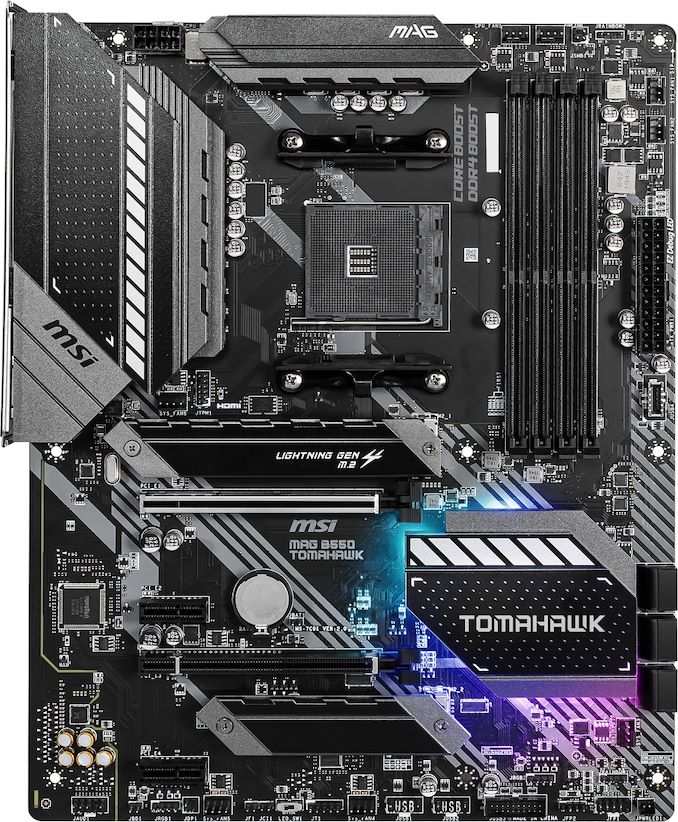The AMD B550 Motherboard Overview: ASUS, GIGABYTE, MSI, ASRock, and Others
by Dr. Ian Cutress & Gavin Bonshor on June 16, 2020 11:00 AM ESTMSI MAG B550 Tomahawk
Perhaps one of MSI’s most important models on any B series chipset is its MAG Tomahawk series. Highly popular with consumers due to offering solid features at a very competitive price point, the MSI MAG B550 Tomahawk has some interesting features with dual M.2 slots, dual Ethernet including a 2.5 G and Gigabit pairing, with a Realtek ALC1200 HD audio codec.
Starting with the design, the B550 Tomahawk has a contrasting black and grey design, including the heatsinks, rear panel cover, and a patterned PCB. There is one element of RGB LED lighting which can be found underneath the chipset heatsink. It features two full-length PCIe slots with the top slot operating at PCIe 4.0 x16, and a second PCIe 3.0 x4 slot which derives from the chipset. For storage, the B550 Tomahawk includes two PCIe M.2 slots, with the top slot benefiting from PCIe 4.0 x4 support, and the second slot locked at a maximum of PCIe 3.0 x4. Both M.2 slots include separate M.2 Frozr heatsinks, while for SATA drives, MSI includes six SATA ports. A total of four memory slots are present with the capability to install up to 128 GB, with speeds of up to DDR4-5100 officially supported.
Like the majority of MSI’s B550 models, the B550 Tomahawk includes a single USB 3.2 G2 Type-C, and a single USB 3.2 G2 Type-C port, with two USB 3.2 G1 Type-A and two USB 2.0 ports also present. For networking, there are two RJ45 Ethernet ports, with one controlled by a Realtek RTL8125B 2.5 GbE controller, while the other port is controlled by a Realtek’s Gigabit RTL8111H. A Realtek ALC1200 HD audio codec powers the five 3.5 mm audio jacks and S/PDIF optical output, while the rear panel also includes video outputs for Ryzen APU’s which consists of an HDMI and DisplayPort pairing. Finishing off the rear panel is a small BIOS Flashback button and a PS/2 Keyboard and Mouse combo port.
The MSI MAG B550 Tomahawk is an interesting model as MSI seems to have shifted its marketing position going from a solid entry-level model to a more premium offering. For MSI’s MSRP of $180, MSI includes dual Ethernet which its only B550 model at present to feature this, as well as slotting in Realtek 2.5 G Ethernet controller for good measure. It has all the hallmarks of its X570 counterpart, aside from full native PCIe 4.0 support, no Wi-Fi, and fewer USB 3.2 G2 connectivity, but at just $20 cheaper. It’s hard to make a case to not opt for the fully-fledged MSI X570 Tomahawk over this model.












101 Comments
View All Comments
Operandi - Tuesday, June 16, 2020 - link
Looks like some nice mATX versions this round, nice!YB1064 - Thursday, June 18, 2020 - link
I was hoping to see a $75-$90 board.kenjiwing - Tuesday, June 16, 2020 - link
Fortunately, this component is a unique motherboard among B550 and well worth reading up on [add link].Needs to be edited.
anirudhs - Tuesday, June 16, 2020 - link
There's a noise sensor which can adjust fan speed for maximum quietness with good thermals. Saw it on the KitGuruTech video. The noise sensor isn't there to spy on you though.PeterCollier - Wednesday, June 17, 2020 - link
The quality of the editing here is shit tier. Seriously, just run the articles through Grammarly before publication. It's free and it spots plenty of errors.Heavenly71 - Tuesday, June 16, 2020 - link
Sadly none of the mITX boards have more than 6 external USB ports. My old ASUS mITX has 8! And in really small mITX cases you can't add a bracket with more USB, because the two brackets are already used by the gfx card. Guess I have to wait for an enthusiast mITX board )-:damianrobertjones - Tuesday, June 16, 2020 - link
Or, just maybe, get a usb dongle with 4 ports?Mr Perfect - Tuesday, June 16, 2020 - link
That is disappointing. The number of USB devices people need to plug in can't be dropping, surely? I know I've got more now then even a year ago.rrinker - Tuesday, June 16, 2020 - link
Are they really going up? I have 2 USB devices plugged in to my system - a keyboard and a mouse. I occasionally plug a USB stick in one of the front ports to transfer files. My phone and tablet sync over wifi, they don't get plugged in. I have a charger behind my desk and a cable to charge them. My printer is on the network.The one place I DO need lots of USB ports is also the place where I have a small cube case machine, with no discreete GPU, because it doesn;t need one. On that one I added a USB PCI card to get enough ports. In addition to the keyboard and mouse, that machine is on my workbench where it connects to several electronic test instruments and I have multiple cabled for programming microcontrollers. I also have a USB microscope for board inspection. And then I have 3 more USB devices connected for my other hobby that shares the bench. Plus a front port kept free for USB sticks.
So the use case I have for more USB has the PCI slots open to add expansion cards, the use case where I have a discrete GPU eating up the slot space doesn't need an excess of USB ports.
DigitalFreak - Tuesday, June 16, 2020 - link
I use 3 USB 3.0 ports just for my Oculus Rift